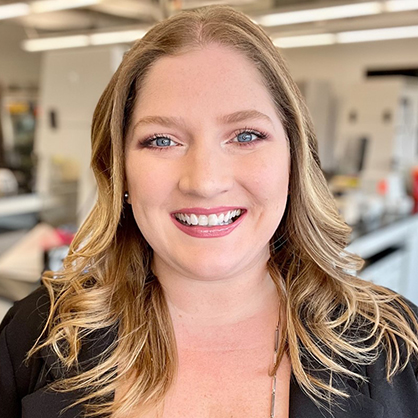Education
Ph.D., Cancer Research/Surgery, National University of Ireland Galway, School of Medicine, Nursing, and Health Sciences.
B.S., Pharmaceutical and Forensic Science, Technological University of the Shannon (formerly named Limerick Institute of Technology), Department of Applied Sciences.
B.A., Psychology, Sociology, and Politics, National University of Ireland Galway
About Claire
Dr. Glynn previously worked as a forensic scientist at Eurofins Forensic Services (formerly named LGC Forensics) in Oxfordshire, England. Eurofins Forensic Services is one of the United Kingdom’s leading forensic science providers for the UK’s police forces. Dr. Glynn worked in the forensic biology department, within the homicide and sexual assaults team, which has investigated some of the UK’s most high-profile crimes.
See More
For her Doctoral degree, Dr. Glynn chose to pursue cancer research, specifically breast cancer, as she wanted her research to be truly impactful, translational, and patient-oriented. The research team that Dr. Glynn worked with is world-renowned in the field of breast cancer research. Her research focused on developing novel biomarkers (microRNAs) for disease diagnosis and treatment. The molecular profiling skills she learned throughout her Ph.D. research are now being researched and applied to forensic applications for the identification of forensically relevant body fluids.
Dr. Glynn, who joined the University of New Haven in 2014, teaches both undergraduate and graduate courses in forensic science, focused on forensic biology, forensic DNA analysis, and Forensic Genetic Genealogy (FGG). Her research interests are focused on FGG, and the broad range of applications for this novel investigatory tool. This includes investigating the effects of degraded samples and novel technologies, establishing best practices, the international feasibility of this tool, historical applications, and ethical considerations, to name just a few. Her other research interests include Rapid DNA analysis, RNA (mRNA and miRNA) analysis, Single Nucleotide Polymorphism (SNPs) applications, and DNA Methylation markers.
Dr. Glynn is the founding Director of the University of New Haven’s online Graduate Certificate in Forensic Genetic Genealogy, and she actively consults and provides subject matter expertise on the topic to law enforcement agencies, both nationally and internationally.
Dr. Glynn was awarded the University of New Haven’s Faculty Excellence in Research and Creative Activity in 2017. She also was designated a University Research Scholar for 2017-2020. Lastly, Dr. Glynn was named one of Connecticut’s “40 under 40” for the Class of 2022 by Connecticut Magazine.
Recently Published Articles
Glynn CL. Potential applications of microRNA profiling to forensic investigations. RNA (New York, N.Y.). 2020 Jan;26(1):1-9. DOI: 10.1261/rna.072173.119.
Moloney, B.M., Gilligan, K.E., Joyce, D.P., O’Neill, C.P., O’Brien, K.P., Khan, S., Glynn, C.L., Waldron, R.M., Maguire, C.M., Holian, E., Naughton, E., Elhadi, M., Grealish, A.B., Malone, C., McDermott, E., Dockery, P., Ritter, T., Prina-Mello, A., Kerin, M.J., Dwyer, R.M. Investigating the Potential and Pitfalls of EV-Encapsulated MicroRNAs as Circulating Biomarkers of Breast Cancer. Cells 2020, 9, 141.
O’Leary, K, Glynn, CL. (2018) Investigating the extraction and amplification of microRNAs for the identification of forensically relevant body fluids. microRNA. DOI : 10.2174/2211536607666180430153821
O'Brien KP, Khan S, Gilligan KE, Zafar H, Lalor P, Glynn C, O'Flatharta C, Ingoldsby H, Dockery P, De Bhulbh A, Schweber JR, St John K, Leahy M, Murphy JM, Gallagher WM, O'Brien T, Kerin MJ, Dwyer RM (2018) Employing mesenchymal stem cells to support tumor-targeted delivery of extracellular vesicle (EV)-encapsulated microRNA-379. Oncogene-Nature. doi:10.1038/s41388-017-0116-9
Schlagetter, T., Kammrath, B., Glynn, CL. (2017). The Use of Raman Spectroscopy for the Identification of Forensically Relevant Body Fluid Stains. Spectroscopy, 32 (12): 19-22
See More
Hartley G, Glynn CL (2017) A Comparative Analysis of Protein and Peroxidase Blood Enhancement Reagents Following Laundering and their Impact on DNA Recovery. Journal of Forensic Research and Analysis, 1(1): 1-5
Schlagetter T and Glynn CL. The Effect of Fabric Type and Laundering Conditions on the Detection of Semen Stains. International Journal of Forensic Sciences, 2(2): 1-5.
Clancy, C., Khan, S., Glynn, CL., Holian, E., Dockery, P., Lalor, P., Brown, J., Joyce, MR., Kerin MJ., Dwyer, RM. (2016). Screening of exosomal microRNAs from colorectal cancer cells. Cancer Biomarkers, 17(4): 427-435.
Waters PS, Dwyer RM, Brougham C, Glynn CL, Wall D, Hyland P, Duignan M, McLoughlin M, Newell J, Kerin MJ. (2015) Impact of tumour epithelial subtype on circulating microRNAs in breast cancer patients. PloS one. 2014;9(3):e90605.
Glynn CL, Khan, Sonja, Kerin, Michael J., Dwyer, Roisin M. (2013) Isolation of secreted microRNAs (miRNAs) from Cell-conditioned Media. MicroRNA. 2013;2(1):14-9.
Courses Taught
- FORS 2216 Introduction to Forensic Science I
- FORS 4403 Forensic Biology with Lab
- FORS 4455 International Perspectives of the Forensic Science Industry
- FORS 6620 Advanced Criminalistics I
- FORS 6621 Advanced Criminalistics I Laboratory
